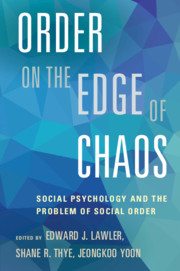Book contents
- Frontmatter
- Contents
- List of Contributors
- Preface
- 1 Social Psychology of Social Order: An Introduction
- 2 The Evolutionary Biology and Sociology of Social Order
- 3 Social Rationality and Weak Solidarity: A Coevolutionary Approach to Social Order
- 4 An Integrative Theory of Action: The Model of Frame Selection
- 5 The Center Cannot Hold: Networks, Echo Chambers, and Polarization
- 6 Social Exchange and Social Order: An Affect Theory Approach
- 7 Institutions, Trust, and Social Order
- 8 Identity Verifi cation and the Social Order
- 9 Identities, Roles, and Social Institutions: An Affect Control Account of Social Order
- 10 The Gender Frame and Social Order
- 11 Status, Power, and Social Order
- 12 Interaction Order: The Making of Social Facts
- 13 The Arts of Together: Social Coordination as Dyadic Achievement
- 14 Dignity as Moral Motivation: The Problem of Social Order Writ Small
- 15 The Legitimacy of Groups and the Mobilization of Resources
- Commentary: Contrasts and Complementarities
- Index
- References
7 - Institutions, Trust, and Social Order
Published online by Cambridge University Press: 05 December 2015
- Frontmatter
- Contents
- List of Contributors
- Preface
- 1 Social Psychology of Social Order: An Introduction
- 2 The Evolutionary Biology and Sociology of Social Order
- 3 Social Rationality and Weak Solidarity: A Coevolutionary Approach to Social Order
- 4 An Integrative Theory of Action: The Model of Frame Selection
- 5 The Center Cannot Hold: Networks, Echo Chambers, and Polarization
- 6 Social Exchange and Social Order: An Affect Theory Approach
- 7 Institutions, Trust, and Social Order
- 8 Identity Verifi cation and the Social Order
- 9 Identities, Roles, and Social Institutions: An Affect Control Account of Social Order
- 10 The Gender Frame and Social Order
- 11 Status, Power, and Social Order
- 12 Interaction Order: The Making of Social Facts
- 13 The Arts of Together: Social Coordination as Dyadic Achievement
- 14 Dignity as Moral Motivation: The Problem of Social Order Writ Small
- 15 The Legitimacy of Groups and the Mobilization of Resources
- Commentary: Contrasts and Complementarities
- Index
- References
Summary
Abstract
Trust theories suggest that the human capacity to trust and to be trustworthy is an important element in the production of micro social order. Trust can take the form of generalized beliefs (attitudes) about the trustworthiness of people in the abstract or be based on information about behaviors indicative of the trustworthiness of specific others in particular situations. In either case, trust involves an expectation that one or more others will cooperate or collaborate, despite the opportunity to exploit or act out of pure self-interest. We explore the general role of trust in the production of collective efforts and its limits as the basis for large-scale cooperation and macro-social order.
INTRODUCTION
Trust is important not only because it increases the regularity and predictability of social interaction, but also because it leads people to collaborate and generate joint goods that otherwise would not be produced (Yamagishi and Yamagishi 1994; Fukuyama 1995; Yamagishi, Cook, and Watabe, 1998; Zak and Knack 2001; Knack and Zak 2003; Cook, Hardin, and Levi 2005). It also extends the reach of social control mechanisms especially when monitoring and sanctioning are not possible. In addition, in many circumstances it reduces transaction costs since if the parties to an exchange are generally trustworthy with respect to one another and have some interest in maintaining the relationship and/or their reputations as trustworthy actors they will behave in a reliable manner, making for more beneficial transactions.
Despite the generally recognized benefits of trust, Cook, Hardin, and Levi (2005) argue that while trust may generate order at the micro level it is typically ineffective as a source of macro-level social order. Information requirements are simply too great to know whom to trust in a large complex organization or community and the risks involved are often too substantial to leave to the vagaries of individual behavior. In this chapter I explore the conditions under which trust does operate to produce micro social order and the conditions under which we rely on institutional mechanisms instead to undergird and create the conditions for macro social order.
- Type
- Chapter
- Information
- Order on the Edge of ChaosSocial Psychology and the Problem of Social Order, pp. 125 - 144Publisher: Cambridge University PressPrint publication year: 2015
References
- 25
- Cited by

